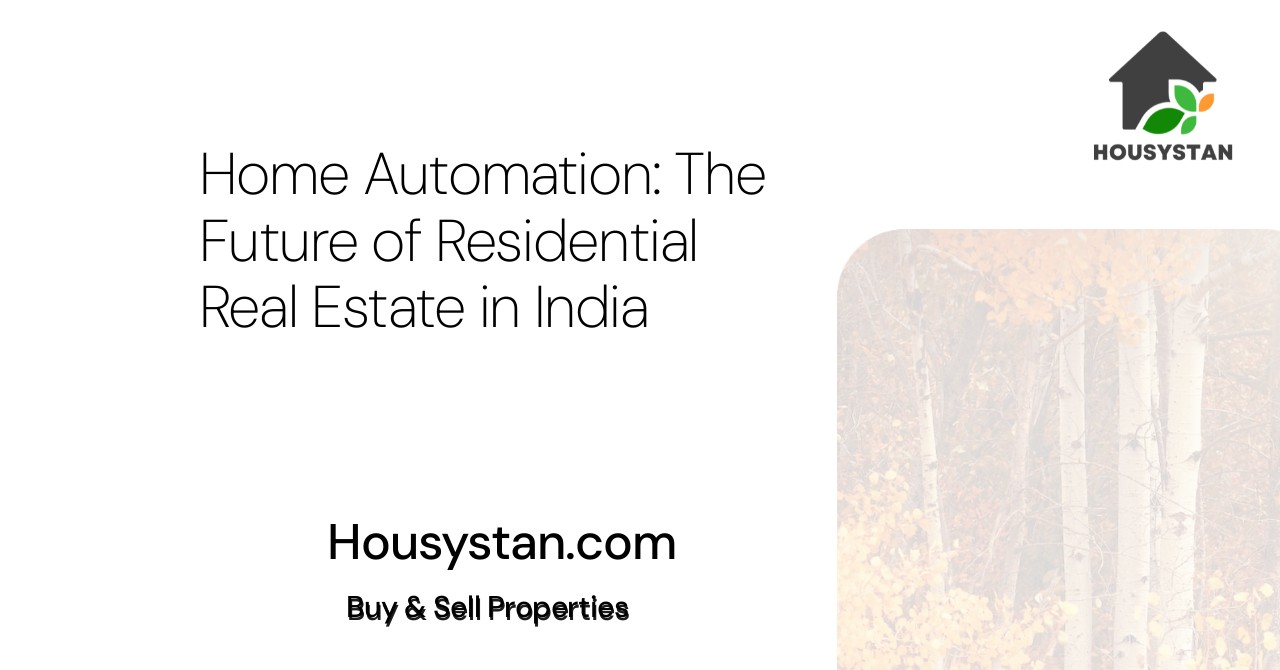Home Automation: The Future of Residential Real Estate in India
Read latest blogs and articles from Housystan

The Information mentioned here was last updated on:
21/2/2026Home Automation: The Future of Residential Real Estate in India
Introduction: A Revolution in Indian Homes
In recent years, the concept of home automation has taken India’s residential real estate market by storm. From metropolitan cities like Mumbai and Bengaluru to tier-2 towns, more homeowners are embracing smart technologies to enhance their living experience. Home automation refers to the integration of advanced devices and systems that allow residents to control lighting, security, temperature, and appliances remotely through smartphones or voice commands. As India rapidly urbanizes and digital connectivity deepens, home automation is reshaping how people interact with their living spaces. This transformation is not just a trend—it’s the future of modern Indian homes.
- Verified Tenants/Buyers
- Unlimited Property Listing
- Zero subscription/charges fee
Understanding Home Automation: Key Features and Benefits
Home automation systems encompass a variety of technologies designed to make everyday life more convenient, safe, and energy-efficient. These include smart lighting, automated climate control, security cameras, smart door locks, and integrated entertainment systems. By allowing users to control and customize their home environment from anywhere, these systems offer unmatched comfort and peace of mind. For example, a homeowner can adjust the air conditioning before arriving home, monitor security cameras while traveling, or receive instant alerts if unusual activity is detected.
The Driving Forces Behind Home Automation in India
Several factors are fueling the rapid adoption of home automation in India. Firstly, the surge in internet penetration and affordable smartphones has made smart home products accessible to a wider audience. Secondly, the rise in dual-income households and busy urban lifestyles has increased the demand for convenience and time-saving solutions. Thirdly, a growing emphasis on security and energy conservation has prompted homeowners to seek intelligent systems that can reduce electricity bills and enhance safety. Real estate developers are also recognizing the value of integrating smart technologies to attract buyers and differentiate their offerings in a competitive market.
Smart Homes: A Boon for Urban Living
In densely populated Indian cities, home automation offers practical solutions to everyday challenges. Automated lighting and climate control can significantly reduce energy wastage, while video doorbells and smart locks provide an added layer of security against break-ins. For families with elderly members or children, smart sensors can detect emergencies such as gas leaks or fires and alert residents or emergency services instantly. These features not only improve quality of life but also contribute to sustainable urban living by optimizing resource consumption.
Impact on Residential Real Estate Development
The integration of home automation is redefining residential real estate in India. Developers are increasingly including smart home features as standard offerings in new projects, especially in premium and mid-segment housing. Automated lighting, centralized control systems, and intelligent security solutions are fast becoming key differentiators. This technological edge can command higher property values and faster sales cycles. Moreover, homebuyers, particularly millennials and tech-savvy professionals, are actively seeking properties equipped with modern automation systems, viewing them as essential rather than optional luxuries.
Challenges and Opportunities in the Indian Market
Despite its promise, the adoption of home automation in India faces certain challenges. High initial costs, limited awareness, and concerns about data privacy can deter some buyers. However, as technology advances and economies of scale kick in, prices are expected to become more affordable. Educational initiatives by real estate developers, tech companies, and the government can also help bridge the knowledge gap. With increasing demand, local startups are innovating with tailor-made solutions for Indian homes, focusing on compatibility with existing appliances and easy installation.
The Role of Government and Policy Initiatives
Government policies promoting smart cities and digital infrastructure are indirectly boosting the home automation industry. Initiatives like Digital India and the Smart Cities Mission encourage the adoption of IoT (Internet of Things) and automated systems in urban planning. As regulatory frameworks evolve to address data security and interoperability standards, the industry is poised for robust growth. Collaboration between public and private stakeholders can further accelerate the integration of smart technologies in residential projects across India.
Consumer Trends: What Indian Homebuyers Want
The modern Indian homebuyer is increasingly tech-conscious and value-driven. Key preferences include seamless connectivity, easy-to-use interfaces, and personalized automation experiences. Voice-activated assistants, remote-controlled lighting, and app-based security systems top the wish lists. Additionally, environmental consciousness is driving interest in energy-efficient and sustainable smart solutions. Real estate agents report that properties with pre-installed smart home systems often receive more inquiries and command premium pricing, reflecting the shifting priorities of today’s buyers.
Future Outlook: Home Automation as a Standard Feature
Looking ahead, home automation is set to become a standard feature in Indian residential real estate. As costs decline and technology matures, smart homes will no longer be limited to luxury apartments or gated communities. Mass-market adoption is expected, with modular and scalable solutions catering to a wide range of budgets. Advancements in artificial intelligence, machine learning, and 5G connectivity will further expand the possibilities, enabling more intuitive and predictive home environments. The future Indian home will be safer, smarter, and more sustainable, thanks to the ongoing evolution of automation technologies.
Conclusion: Embracing the Smart Home Revolution
The future of residential real estate in India is being shaped by the rapid rise of home automation. As homeowners seek greater comfort, security, and efficiency, smart technologies are transforming traditional houses into intelligent living spaces. For developers, embracing this trend means staying ahead in a competitive market and meeting the evolving demands of a new generation of buyers. For residents, it means enjoying a lifestyle defined by convenience, safety, and sustainability. Home automation is not just a passing fad—it is the foundation upon which the future of Indian real estate will be built.